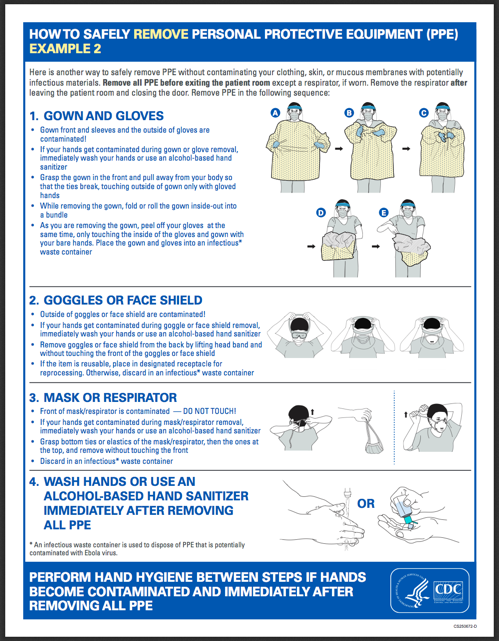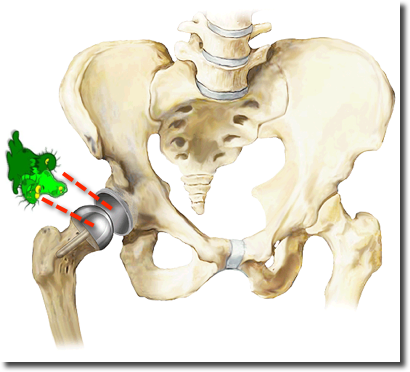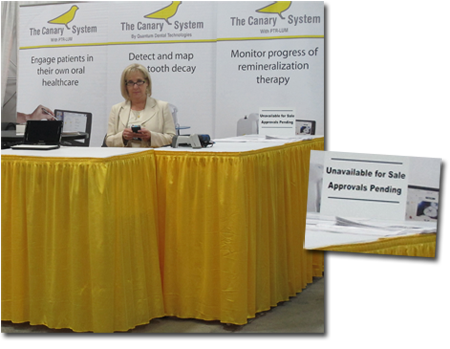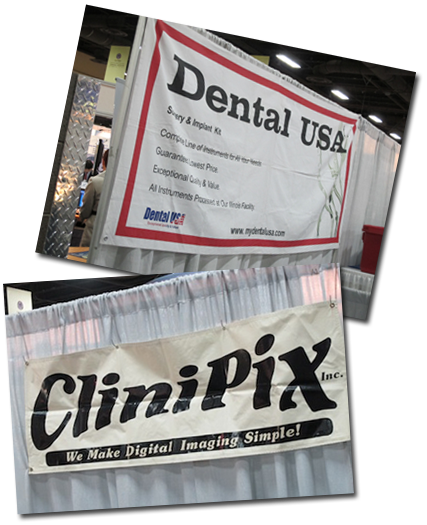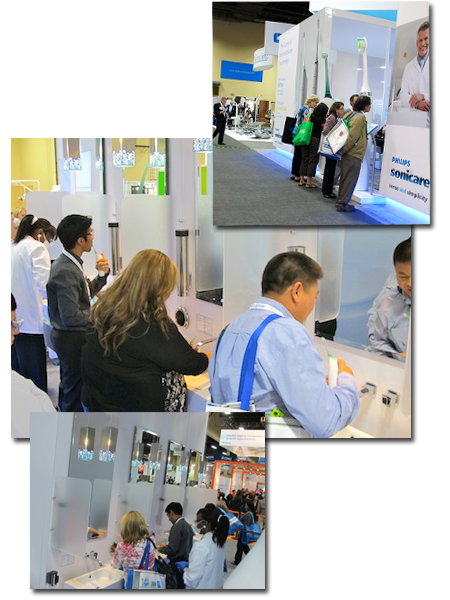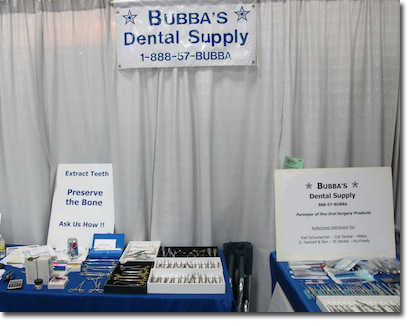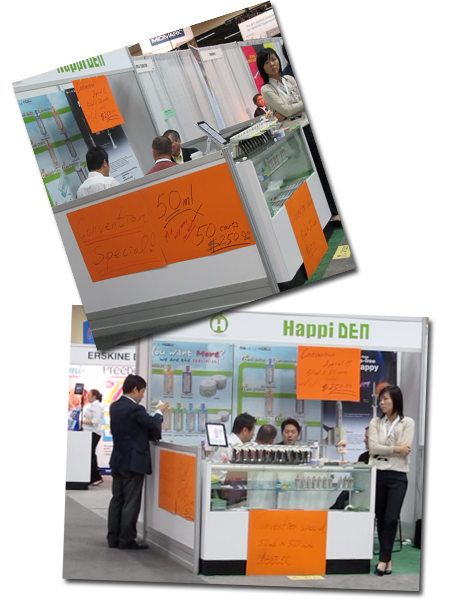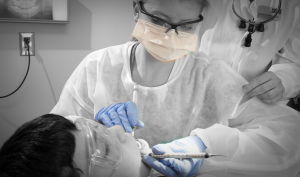 At first I wasn’t worried. I was probably like you, thinking this was halfway around the world, and that it was their problem.
At first I wasn’t worried. I was probably like you, thinking this was halfway around the world, and that it was their problem.
And then… it wasn’t just their problem. It became mine, too.
Now, I’m no infectious disease expert. I’m simply a dental hygienist who lives in the Dallas area, the center of the recent Ebola panic. And we should be terrified of what Ebola does to its victims. It’s scary, it’s creepy, and it’s lethal, in a super-speedy, no-time-to-say-goodbye-to-your-loved-ones zombie apocalypse way that you have probably freaked yourself out about enough already.
Instead, let’s look at how this affects us in dentistry. The question that is coming up most often between dental healthcare providers right now is “what are we supposed to do?”
The CDC offered the following Q&A reply to an American Dental Association inquiry this past September:
“Can I provide dental services to someone who has recently been in West Africa?
“CDC works with partners at ports of entry into the United States to help prevent infectious diseases, like Ebola, from being introduced and spread in the United States.
“A person infected with Ebola is not contagious until symptoms appear. Signs and symptoms of Ebola include fever (greater than 38.6°C or 101.5°F) and severe headache, muscle pain, vomiting, diarrhea, stomach pain or unexplained bleeding or bruising.
“The virus is spread through direct contact [CDC emphasis] (through broken skin or mucous membranes) with blood and body fluids (urine, feces, saliva, vomit and semen) of a person who is sick with Ebola, or with objects (like needles) that have been contaminated with the virus. Ebola is not spread through the air or by water or, in general, by food.
“Dental providers should continue to follow standard infection control procedures.”
And from the ADA website:
There is no risk of transmission of Ebola from asymptomatic infected patients. According to the ADA Division of Science and Professional Affairs, dental professionals are advised to take a medical history, including a travel history from any person with symptoms in which a viral infection is suspected. If Ebola is suspected, dental professionals may need to protect themselves with physical barriers (gowns, masks, face protection, and gloves), and contact their state or local health department.
According to the CDC, “Providers should consider Ebola in patients who develop a fever greater than 101.5 degrees Fahrenheit, severe headache, muscle pain, diarrhea, vomiting, stomach pain, or unexplained bruising or bleeding 21 days after traveling from Guinea, Liberia, Nigeria, or Sierra Leone.” Standard precautions should be used on all patients as a matter of routine.
So, did you actually READ any of the statements above? Basically, it’s saying to all dentists, hygienists, and dental assistants, move along, nothing here to see, business as usual as long as no one has been to Africa. Okay, so that used to be true.
The problem is that even though proper protocols are in place, that mean one of two things is happening to cause Ebola to infect people in the US:
1) We are not following Universal Precautions properly, or
2) Universal Precautions as we know them are inadequate.
Case in point. Today a health care worker was accused of breaching the PPE protocol because she has been now diagnosed with Ebola. The second one in our country. It could have been the other guy; you know, the deputy who went into the Ebola apartment without a Hazmat suit that ended up getting quarantined at an urgent care center up in Frisco?
Yeah, it got pretty crazy in our town last week, because he lives here. In fact, his daughter goes to school with our son. Thankfully our town responded very amazingly to him and his family at the time of crisis and we were all very relieved that it ended up being a false alarm.
So, if the problem is that we’re not following Universal Precautions, maybe then, we all need a little more muscle memory in our procedures so that we’re already doing our best if this stuff ever does become epidemic.
I know that I’m not always faithful about taking my loupes, mask, and gloves off the perfect way, every time, but you better believe that I’m going to be practicing this with chocolate syrup on my gloves the next time I’m in the office.
Seriously, maybe it’s time for your team to refresh themselves on how to properly remove their personal protective equipment.
Come on, who wouldn’t want to be in a room full of women (as is the case with most dental teams), passing around a bottle of Hershey’s, adding a little drizzle onto each person’s gloved hands, watching the syrup slick between their latex or nitriled-up fingers, then having them do a striptease routine in front of each other to see if they contaminate themselves?
Believe it or not, this is something that the OSHA recommends. If you’d prefer the CDC’s boring version to practice, though, you can print this PDF out instead:
As far as the other scenario? The one where the infectiousness of Ebola is far, far worse than what our sacred Universal Precautions can handle? What DO you say about that? Hey, nice knowing you, I’m changing professions now, love ya, see ya around but not here, bye?
Let’s hope then – for everyone’s sake – that we have all just been sucking at taking our gloves and masks off.
 A blogger since 1997, Trish Walraven, RDH, BSDH is a practicing dental hygienist and marketing manager for an indie dental software development company. She’s now concerned about the effectiveness of the mask she’s currently using in her office but continues to put it on the list of low priorities until the zombies actually come crashing into her operatory.
A blogger since 1997, Trish Walraven, RDH, BSDH is a practicing dental hygienist and marketing manager for an indie dental software development company. She’s now concerned about the effectiveness of the mask she’s currently using in her office but continues to put it on the list of low priorities until the zombies actually come crashing into her operatory.
UPDATE – October 16, 2014:
(Now THIS is more like it!)
ADA American Dental Association
Guidance to Dental Professionals on the Ebola Virus
A person infected with Ebola is not considered contagious until symptoms appear. Due to the virulent nature of the disease, it is highly unlikely that someone with Ebola symptoms will seek dental care when they are severely ill. However, according to the Centers for Disease Control and Prevention and the ADA Division of Science, dental professionals are advised to take a medical history, including a travel history from their patients with symptoms in which a viral infection is suspected.
Any person within 21 days of returning from the West African countries Liberia, Sierra Leone and Guinea may be at risk of having contacted persons infected with Ebola and may not exhibit symptoms. If this is the case, dental professionals are advised to delay routine dental care of the patient until 21 days have elapsed from their trip. Palliative care for serious oral health conditions, dental infections and pain can be provided if necessary after consulting with the patient’s physician and conforming to standard precautions and physical barriers.
You are advised not to treat dental patients if they have the signs and symptoms for Ebola. If a patient is feeling feverish and their travel history indicates they may be at risk of Ebola, dental professionals and staff in contact with the patient should:
• protect themselves by using standard precautions with physical barriers (gowns, masks, face protection, and gloves)
• immediately call 911 on behalf of the patient
• notify the appropriate state or local health department authorities
• ask the health department to provide you and your staff with the most up-to-date guidance on removing and disposing of potentially contaminated materials and equipment, including the physical barriers.
The Ebola virus is spread through direct contact (through broken skin or mucous membranes) with blood and body fluids (urine, feces, saliva, vomit and semen) of a person who is sick with Ebola, or with objects (like needles) that have been contaminated with the virus. Ebola is not spread through the air or by water or, in general, by food. Again, there is no reported risk of transmission of Ebola from asymptomatic infected patients.

